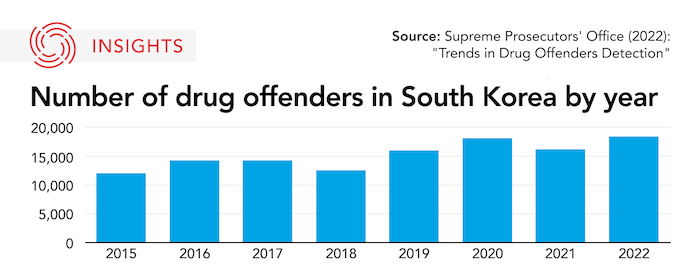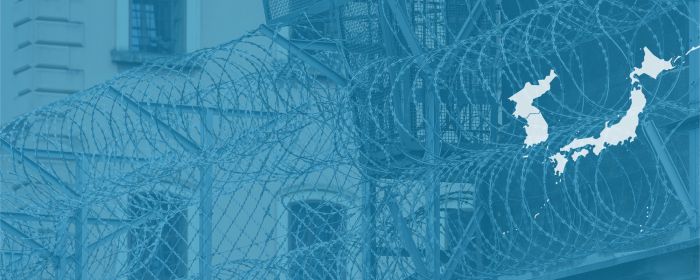The Takeaway
Several high-profile, drug-related incidents involving young people in South Korea have boosted public awareness of the issue, serving as distressing flashpoints and highlighting the uptick in drug-related crimes across the country. In recent months, the South Korean government has been under pressure to respond and improve the country’s drug management system.
In Brief
Drug offences are on the rise in South Korea. A number of high-profile incidents in recent months prompted a surge in public awareness, and induced authorities to crack down on the country's drug trade by bolstering customs enforcement, among other policies.
One incident in early April saw unwitting students consume free drinks laced with methamphetamines and ecstasy. The drinks were distributed outside of “cram schools” — private institutions offering education outside of regular school hours — in Gangnam, South Korea. The suspects who handed out the beverages claimed that the drinks would boost students’ concentration and memory. These same individuals later tried to extort money from the students’ parents by threatening to report the (drugged) teenagers to authorities.
This case reminded many of drug-related cases involving heirs to chaebol (large businesses controlled by an individual or family) and celebrities. Drug scandals involving celebrities in South Korea often spark harsh rebukes of the celebrities in question, as drug use is stigmatized.
The Supreme Prosecutors’ Office reported a 30 per cent increase in drug offenders over five years, rising from 14,123 in 2017 to 18,395 in 2022. The number of drug offenders from January to February 2023 was 2,600, an increase of 32.8 per cent compared to the same period in 2022. Almost 60 per cent of those convicted of drug crimes in 2021 were 39 or younger, with the number of teenage drug offenders jumping fourfold from 119 in 2017 to 481 in 2022.

Inadequate prevention and diverse drug distribution channels contribute to the increasing number of drug offences and first-time offenders. South Korea faces even greater risks as drug-related crimes become more sophisticated through social media and phishing scams, while newer technologies like cryptocurrency can sometimes circumvent authorities.
Implications
The recent rise in drug offences, especially among teenagers, indicates that drug management in South Korea faces challenges. South Korea has historically focused on strengthening drug control and raising sentencing standards. Currently, drug crimes are punishable by up to 14 years in prison for repeat offenders and dealers. Some drug crimes are even punishable by death, although South Korea has not carried out executions since 1997. First- and second-time offenders, however, receive suspended sentences and 30 to 40 hours of mandatory drug education.
On April 18, South Korean President Yoon Suk Yeol announced that his government would strengthen its crackdown on drug crimes by expanding drug education through a pan-governmental push. These measures aim to stamp out teenage drug use and monitor online advertisements that promote illegal drugs, while also punishing doctors who illegally prescribe higher-than-necessary doses as well as drug users who get prescribed drugs from different doctors.
Despite efforts to address the drug issue in South Korea, concerns persist about the scarcity of drug-related rehabilitation centres. There are currently only six rehabilitation centres in the country, with just two run by South Korea’s food and drug safety ministry. The lack of rehabilitation services has left many drug users funding their own treatment. Former drug users have emphasized the need for greater accessibility to comprehensive rehabilitation treatments and a distinction between "discontinuation" and "recovery" in treatment programs.
Although mandating a minimum of 10 hours of drug prevention education annually in Korean primary and secondary schools starting in 2023 is a positive step, a more holistic approach is necessary. This would involve combining educational efforts with greater access to essential resources and analyzing the societal factors influencing drug use.
What's Next
- Compelling rehabilitation?
There have been calls from psychologists and recovery advocates for a system that can legally mandate people to undergo rehabilitation treatment after leaving prison to prevent a relapse into drug use. Various procedures, such as hospitalization, admission, and outpatient treatment, should be devised for recovery and treatment.
- Foreigners’ role in South Korea’s drug issue
As the government expands its efforts to fight the drug trade, many news reports have emerged regarding cases involving foreigners allegedly smuggling and consuming drugs. Considering the complex social implications of drug use, future research and policy efforts should focus on addressing underlying causes and preventing any bias against foreigners.
- International co-operation
The United Nations Office on Drugs and Crime (UNODC) is a global organization that works with member states to promote international co-operation in drug control and crime prevention. Both Canada and South Korea are UNODC members. Through UNODC, Canada and South Korea can share best practices, participate in joint initiatives, and collaborate on research and data collection to address drug prevention issues.
• Produced by CAST's Northeast Asia team: Dr. Scott Harrison (Senior Program Manager); Momo Sakudo (Analyst); Tae Yeon Eom (Analyst); and Sue Jeong (Analyst).




